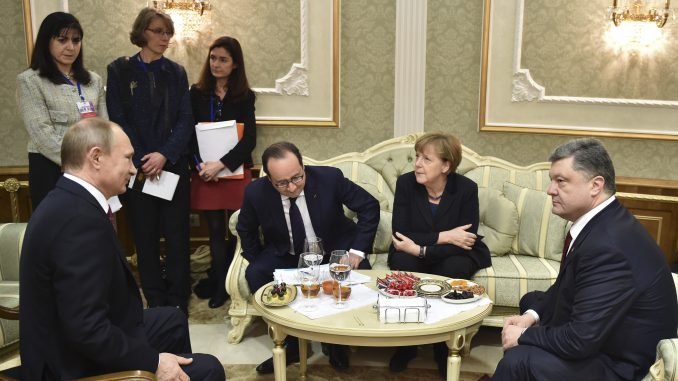
“Even if an agreement is reached, the question is whether it will be bad or very bad for Ukraine and the European security system. Bad or very bad –that’s the choice as judging from those fragments, details we have seen, Russia, obviously, wants to retain that leverage in its hands, especially if we speak about border control. Judging from the negotiation positions, Russia is imposing its conditions and the question is whether Ukraine will be able to withstand or not,” Kasčiūnas told BNS on Thursday.
Soon after his comments, Russian President Vladimir Putin announced to the media that a ceasefire was agreed upon to start on 15 February.
Following the overnight four-party talks, Ukrainian President Petro Poroshenko said on Thursday that Russia had set out “unacceptable conditions” for the end of the ongoing conflict in eastern Ukraine but the talks continue.
Speaking about Moscow’ conditions, Kasčiūnas underlined that Kiev would hardly accept the Kremlin’s imagined scenario on the status of the Donbass and Luhansk territories.
“We are speaking about a special status but Moscow and Kiev, obviously, have different visions what that special status should be. Moscow wants Kiev to resume funding of this region and for this autonomous region to have its own security structures, independent or semi-independent. I am convinced that Porshenko will not agree to such a concept of autonomy as it would in fact mean that those terrorists who are killing Ukrainian troops and civilians will become mayors and vice mayors, part of security, and will even get salaries from Kiev,” Kasčiūnas said.
In his opinion, by creating this pro-Russian “inclusion” in Ukraine, Moscow would secure a tactical victory but suffer heavy losses strategically as its actions have awakened NATO, brought the US and Europe closer and united the Ukrainian nation.
“NATO has been awakened and is getting back to the defence planning seen during the Cold War times. All NATO member countries are stepping up defence. The Ukrainians have united as a political nation, irrespective of whether they speak Ukrainian or Russia. Putin has sparked this unity and many other things which are irreversible and will become long-term losses for Russia. That’s the unity of the Americans and Europeans,” the political scientist said.
“Tactically speaking, the Russian president has won something. He is really installing that territorial inclusion inside Ukraine. The question only is to what extent. But on the long-term strategic level, Russia has lost,” Kasčiūnas said.
Speaking about Europe’s stance, he believes strict compliance with the introduced sanctions is necessary. “The West must act very wisely in terms of sanctions. Not to hurry to lift them, thinking that a new balance is setting in, but stick to them wisely as they are affecting Russia,” the expert said.

Be the first to comment